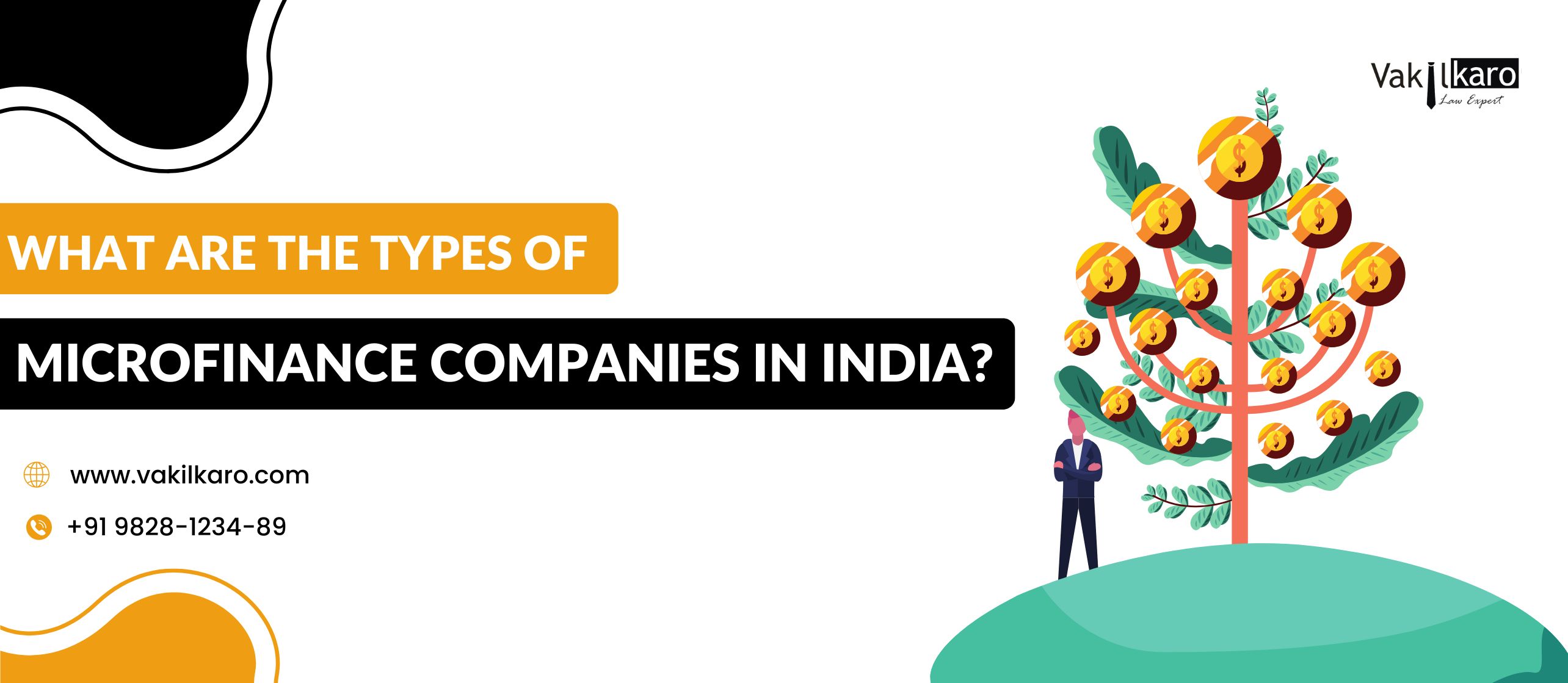Understanding the Types of Microfinance Companies in India
Microfinance institutions play a vital role in providing financial services to underserved communities, enabling small businesses and individuals to access credit. In India, there are different types of microfinance companies, each with its own regulatory framework and operational structure. The primary categories include Non-Banking Financial Companies – Microfinance Institutions (NBFC-MFIs), Section 8 Companies, and Trusts or Societies. Understanding their differences is crucial for entrepreneurs looking to enter the microfinance sector.
NBFC-MFIs are financial institutions regulated by the Reserve Bank of India(RBI). These entities primarily offer small loans to low-income borrowers while maintaining at least 85% of their assets as microfinance loans. To establish an NBFC-MFI, businesses must undergo a micro finance company registration process which includes incorporating a company, maintaining a minimum net-owned fund of ₹5 crores (₹2 crores for the Northeast region), and obtaining RBI approval. Due to these requirements, the micro finance company registration fee for NBFC-MFIs is significantly higher, often ranging from ₹5 to ₹10 lakhs, excluding the capital investment.
Section 8 Companies operate under the Companies Act, 2013 and focus on providing financial services for social welfare rather than profit. They do not require RBI approval and have no minimum capital requirements, making them a cost-effective alternative. The microfinance company registration fees for a Section 8 Company typically range between ₹20,000 and ₹50,000, making it an accessible option for social entrepreneurs.
Trusts and Societies also provide microfinance services, particularly in rural areas. They are not governed by RBI regulations and can raise funds through grants. Registration costs are minimal, usually between ₹10,000 and ₹30,000. Entrepreneurs must choose the right model based on their financial goals and compliance capabilities.
Microfinance plays a crucial role in providing financial services to individuals and small businesses that lack access to traditional banking systems. In India, microfinance companies cater to the needs of low-income groups, rural entrepreneurs, and small business owners by offering microloans, insurance, savings accounts, and other financial products. Understanding the different types of microfinance companies is essential for entrepreneurs looking to enter this sector. This guide explores the various types of microfinance companies in India and provides insights into the micro finance company registration process, micro finance company registration fee, and microfinance company registration fees.

Introduction
A trademark is a unique symbol, word, phrase, logo, design, or combination thereof that distinguishes a brand’s goods or services from competitors. It serves as a form of intellectual property, granting exclusive rights to the owner and preventing others from using similar marks that might confuse consumers. A registered trademark enhances brand recognition, builds customer trust, and offers legal protection against unauthorized use. To safeguard your brand identity, businesses must go through a trademark registration process, which provides legal rights and exclusive ownership of the mark.
Importance of Trademarks
Trademarks play a crucial role in business by establishing a brand’s identity and reputation. They help customers identify and differentiate products and services in the market. Some key benefits of trademarks include:
- Brand Protection – Prevents unauthorized use of your brand identity by competitors.
- Exclusive Rights – Gives the owner sole rights to use the trademark nationwide.
- Legal Security – Allows the owner to take legal action against infringement.
- Brand Recognition – Builds consumer trust and increases market value.
- Asset Creation – A trademark can be licensed, sold, or franchised, adding value to the business.
Types of Trademarks
Before you apply for a trademark, it’s essential to understand the different types of trademarks available:
- Word Marks – Consist of text, such as brand names or slogans (e.g., Nike, Coca-Cola).
- Logo Marks – Unique graphic symbols or designs representing a brand (e.g., Apple logo).
- Service Marks – Used for services rather than products (e.g., FedEx, Airbnb).
- Collective Marks – Represent a group or association (e.g., CA for Chartered Accountants).
- Certification Marks – Indicate quality or standard certification (e.g., ISO, FSSAI).
- Sound Marks – Unique audio elements used in branding (e.g., Nokia ringtone, MGM lion’s roar).
- Color Trademarks – Specific colors associated with a brand (e.g., Tiffany blue, Cadbury purple).
- Shape Marks – Unique product shapes (e.g., Coca-Cola bottle design).

The Trademark Registration Process
The trademark registration process involves multiple steps to ensure the protection of your brand identity. Here’s a step-by-step guide:
Step 1: Conduct a Trademark Search
Before filing a trademark application, conduct a thorough search on the Intellectual Property India (IPI) website to ensure your desired mark is unique and not already registered. This helps avoid conflicts and rejections during the registration process.
Step 2: Choose the Appropriate Trademark Class
Trademarks are categorized into 45 different classes, based on the nature of goods or services. It is important to select the correct class to ensure comprehensive protection of your brand.
Step 3: Prepare the Trademark Application
To apply for a trademark, you need to gather the required details and documents, including:
- Applicant’s name and address
- Trademark logo or wordmark
- Description of goods/services
- Power of Attorney (if applying through an agent)
- Trademark class selection
Step 4: File the Trademark Application
The trademark application can be filed online through the Intellectual Property India website or physically at the Trademarks Registry Office. Upon successful submission, you will receive an acknowledgment with a trademark application number.
Step 5: Examination and Objections
The Trademark Registrar examines the application to check for compliance with laws and existing trademarks. If there are objections, the applicant must respond within the given time frame to resolve any issues.
Step 6: Publication in the Trademark Journal
If the application is approved, it is published in the Trademark Journal for public review. If no objections are raised within four months, the trademark moves toward final registration.
Step 7: Trademark Registration and Certification
Once the trademark clears the opposition phase, the Trademark Office issues a Certificate of Registration, granting the owner exclusive rights over the mark for 10 years, with renewal options.
Trademark Application Fees
The trademark registration fees vary depending on the applicant type and filing method. Below is an estimated breakdown:
- Individual/Startup/Small Enterprise: ₹4,500 (online filing) / ₹5,000 (physical filing)
- Company/LLP/Other Entities: ₹9,000 (online filing) / ₹10,000 (physical filing)
These fees cover a single trademark in one class; additional fees apply for multiple classes.
Common Reasons for Trademark Rejections
While filing a trademark application, certain mistakes can lead to rejection. Common reasons include:
- Similarity to Existing Trademarks – If the mark closely resembles another registered trademark.
- Descriptive or Generic Terms – Marks that describe common characteristics (e.g., “Best Shoes” for footwear) are not unique.
- Lack of Distinctiveness – The mark must be original and easily distinguishable.
- Offensive or Prohibited Content – Marks containing offensive language or violating moral standards are rejected.
- Incorrect Class Selection – Filing under the wrong class may result in application denial.
Trademark Renewal and Protection
A registered trademark is valid for 10 years and can be renewed indefinitely. To maintain protection, businesses should:
- Renew before expiry – File a renewal application within six months before expiration.
- Monitor for Infringement – Regularly check for unauthorized usage of the trademark.
- Enforce Trademark Rights – Take legal action against trademark infringement to protect brand identity.
International Trademark Registration
Businesses looking to expand globally can apply for a trademark internationally through the Madrid Protocol. This allows companies to file a single application to register a trademark in multiple countries, simplifying the process for international brand protection.
Conclusion
A trademark is an essential asset that protects a brand’s identity and distinguishes its products and services from competitors. By going through the trademark registration process, businesses gain legal ownership and exclusive rights, preventing unauthorized usage.
Whether you are a startup or an established company, it is crucial to apply for a trademark to secure your brand’s future and ensure long-term success. Understanding the trademark application process, fees, and legal requirements can help entrepreneurs navigate registration smoothly and safeguard their business reputation.
Why Choose Vakilkaro for Trademark Registration and Other Legal Services?
Vakilkaro is a trusted legal service provider known for its expertise in trademark registration, legal compliance, and business advisory. If you need to apply for a trademark, Vakilkaro simplifies the process by offering end-to-end assistance, from conducting a trademark search to filing a trademark application and obtaining final approval. Their team of experienced professionals ensures accuracy, reducing the risk of objections or rejections.
Vakilkaro provides cost-effective solutions with transparent trademark registration fees, ensuring affordability for startups, small businesses, and large enterprises. Their efficient handling of documentation, legal compliance, and follow-ups with the Trademark Registry saves clients time and effort.
Beyond trademarks, Vakilkaro offers a wide range of services, including microfinance company registrationGST registrationintellectual property protection, contract drafting, and legal dispute resolution. Their client-focused approach ensures personalized guidance, making complex legal processes seamless and hassle-free.
Choosing Vakilkaro means securing expert assistance, timely processing, and comprehensive support for all your legal and business needs. Whether you’re registering a trademark or handling other corporate legalities, Vakilkaro is your reliable partner in legal compliance and business success.